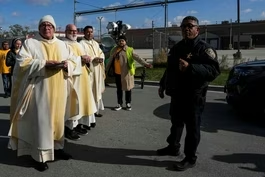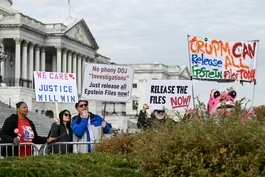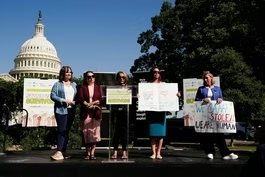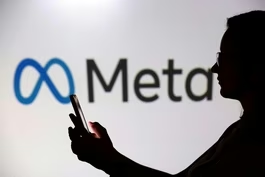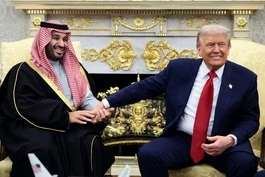
U.S. skipping climate summit undermines progress, Kerry says
Clip: 11/18/2025 | 9m 57sVideo has Closed Captions
As U.S. skips climate summit, John Kerry says absence undermines global cooperation
The United Nations climate summit, known as COP30, will wrap up later this week, and its achievements will likely be more muted this year. Delegates from nearly 200 countries are meeting near the Amazon rainforest, but the Trump administration decided not to send anyone. As part of our Tipping Point series, William Brangham discussed more with former Secretary of State John Kerry.
Problems playing video? | Closed Captioning Feedback
Problems playing video? | Closed Captioning Feedback
Major corporate funding for the PBS News Hour is provided by BDO, BNSF, Consumer Cellular, American Cruise Lines, and Raymond James. Funding for the PBS NewsHour Weekend is provided by...

U.S. skipping climate summit undermines progress, Kerry says
Clip: 11/18/2025 | 9m 57sVideo has Closed Captions
The United Nations climate summit, known as COP30, will wrap up later this week, and its achievements will likely be more muted this year. Delegates from nearly 200 countries are meeting near the Amazon rainforest, but the Trump administration decided not to send anyone. As part of our Tipping Point series, William Brangham discussed more with former Secretary of State John Kerry.
Problems playing video? | Closed Captioning Feedback
How to Watch PBS News Hour
PBS News Hour is available to stream on pbs.org and the free PBS App, available on iPhone, Apple TV, Android TV, Android smartphones, Amazon Fire TV, Amazon Fire Tablet, Roku, Samsung Smart TV, and Vizio.
Providing Support for PBS.org
Learn Moreabout PBS online sponsorshipAMNA NAWAZ: The United Nations climate summit# in Brazil, known as COP 30, will wrap up## later this week, and its achievements# will likely be more muted this year.
Tens of thousands of delegates from nearly# 200 countries are meeting near the Amazon## rain forest, but among those not there, any# official delegation from the United States,## the country that's emitted more carbon# dioxide than any nation on Earth.
William Brangham has more for our# ongoing climate coverage, Tipping Point.
WILLIAM BRANGHAM: The Trump administration's# decision to give COP 30 the cold shoulder follows## other similar dismissals of any efforts# to combat climate change.
The president,## again, pulled the U.S.
out of the# landmark 2015 Paris agreement,## which sought to keep global temperatures# from rising to increasingly dangerous levels.
So to help us understand where things sit# today, we turn to someone with decades## of high-level experience in this realm.# John Kerry was secretary of state under## President Obama and was President Biden's# special presidential envoy for climate.
John Kerry, thank you so much for being here.
You used to lead large delegations# to these COP meetings.
This year,## the U.S.
administration sent no one.
President# Trump says, as you know, that climate change is## the greatest con job in history.
What does it# mean when the American government is absent?
JOHN KERRY, Former U.S.
Secretary of State:# Well, I think it means, first of all,## that the United States is hurting itself, that# the absence of U.S.
leadership and even presence,## just put it at presence, really# defeats the fundamental purpose## of these meetings to some degree, because no# one country can solve this problem by itself.
No country has enough money to# solve this problem by itself.## That's why it's so critical, and we# did in Dubai, in Glasgow, in Paris,## we brought private sectors at the table# to be part of the solution.
We can only## solve this if we galvanize our economies on# a global basis to be curbing carbon dioxide,## to be curbing greenhouse gas pollution, and to be# building out the new energy systems of the future.
What's interesting is, other countries are making# me -- what is it about this issue that one person## in one country in one government says it's a hoax,# and thousands of scientists around the world,## presidents of countries, monarchs,# finance ministers, defense ministers,## environment ministers are all agreeing we must# move urgently and rapidly to cope with this issue?
WILLIAM BRANGHAM: One of your key# victories was the Paris agreement,## which set this goal of keeping additional# warming below two degrees Celsius.
It looks like we are going to blow# through that target.
By most measures,## other countries have failed to meet their# promises made at previous COPs to cut## their emissions.
So does it really matter,# though, if America is not in this arena,## given that we are still so struggling# to get our hands around this problem?
JOHN KERRY: Yes, it does matter.
And let me share with you why.
When President# Obama star.. secretary of state, one of his priorities was# trying to deal with the climate crisis.
Well,## guess what?
You just said it a moment ago.# Countries aren't doing what they promised to do.
And when the United States pulls back, as we have,## it really releases other countries from# the pressure of doing the things that## they promised they would do.
So emissions are# going up, not down.
And what we have done is,## we have seen an unconscious and in some cases# purposeful turning away from the promises made.
For what reason?
Greed, for money, because# there's a reality that the existing system## has revenue streams to oil and gas companies, to# other folks who are arguing against doing things,## and that really just stops things in their track.# So what we need to do is renew our commitments.
Belem is an opportunity to raise the# national efforts, which we did almost## in every year from Paris.
If we go backwards# now, it is going to cost every nation in the## world far more than it would cost to be# moving forward and keeping the promises.
WILLIAM BRANGHAM: Help me understand# a disconnect that I'm seeing here.## There is remarkable progress being# made on solar and wind.
One recent## report indicated that China's emissions,# the biggest current polluter in the world,## might be tapering off or even reducing# largely because of solar and wind.
Given the evidence of how powerful these# technologies are, that they are cheap and## clean, why is it that we are still seeing# a seeming reluctance to embrace them fully?
JOHN KERRY: Because there's a distinct# group that want to continue the status quo.
I mentioned a moment ago the revenue stream.# They're making money.
And now, with energy## demand up, they think they're going to be there to# be the major provider of that new energy.
I don't## think that's the way the world sees it, frankly,# the economies of the world.
The fact is that,## last year, $2.2 trillion went into the venture# capital and the investments of the new energy## economy of solar, wind, and other renewables,# versus one trillion that went into fossil fuel.
That's the first time in human# history there's been that turnaround,## that imbalance.
And I think# that what you see now is many,## many new technologies poised to come online.# Solar is obviously gaining every single year.## Solar is absolutely and wind absolutely# cheaper than fossil fuel production.
So we're really witnessing -- this is a# major moment for the world.
The fact is,## we made promises that could keep the Earth's# temperature increase near the 1.5 degrees, 1.6,## 1.7.
The International Energy Agency says,# if we followed through on the promises that## were made in Glasgow and in Sharm el-Sheikh and# Dubai, if we did the things we promised to do,## we can win the battle, we can hold# the Earth's temperature increase.
We're just not choosing to do that.
Just look at# what's happening in the economy.
Two days ago,## Bloomberg carried a headline saying, you know# who believes in climate change?
The stock market.## And if you look at the stock market,# you will see incredible profits## being made by the deployment of the new# technologies that are not oil and gas.
So if you look across the board at where# we're heading, I think those technologies## are going to win.
I think they win because# new technologies beat old commodities.
And## that is exactly what the marketplace# is beginning to see and experience.
WILLIAM BRANGHAM: Bill Gates,# who you know has long been a## champion of action on climate change,# recently made a little bit of a pivot,## arguing that we could innovate our# way out of the climate crisis and## that we should focus more on human health and# protecting children and deal with diseases.
He also argued seemingly that some of the rhetoric# around climate change, the what he argued was too## apocalyptic language, had harmed the movement# overall.
And I wonder what you think about that.
JOHN KERRY: Well, I understand exactly what# he's saying, and I don't disagree with the## fact that the terminology that has been# used for years has run its course, I think.
To some degree, the efforts to coalesce# action to deal with the climate crisis## has been tarnished by branding that has# purposefully taken place to sort of make## it seem like all people care about is# ESG or it's just a matter of wokism.
And that's because not enough argument# has been made, which I was just making,## about the benefits to the# economy and the strategic## directions that people are taking# on the planet.
Let me be specific.
China.
President Trump and others say, well,# we want it to be -- with China, we want to win## that competition.
We're going to be number one.# Terrific.
But you can't do that by just turning## your back and walking away from the battlefield.# And the battlefield is in the production of## those innovations and technologies that Bill# referred to that are going to win the battle.
Today, China is the largest deployer and# manufacturer of renewables in the world.## China has deployed more renewable energy than# all of the rest of the world put together.## They know this is the new market.
And China# is killing it in that market right now because## they don't have the competition, after all# these years of the predictions of the bad## things that didn't happen that are in fact# happening now, storms, more intense floods,## fires, you name it, all predicted, and# directly relatable to the climate impact.
But we could be addressing all of those things# if we were moving faster to create the jobs and## pursue the technologies that will provide clean# energy.
And if we do that, we're going to win.
WILLIAM BRANGHAM: All right, that is# former Secretary of State and former## Special Presidential Envoy for Climate John Kerry.
Thank you so much for being here.
JOHN KERRY: Thank you, sir.
Bishops push U.S. to end 'dehumanizing' immigration actions
Video has Closed Captions
Clip: 11/18/2025 | 7m 18s | Catholic bishops push U.S. to end 'dehumanizing' immigration enforcement (7m 18s)
A Brief But Spectacular take on finding where you belong
Video has Closed Captions
Clip: 11/18/2025 | 2m 15s | A Brief But Spectacular take on finding a place where you belong (2m 15s)
Congress votes to release Epstein files. What comes next?
Video has Closed Captions
Clip: 11/18/2025 | 4m 30s | What comes next after Congress votes to release the Epstein files (4m 30s)
Epstein survivors' lawyer: 'World will see who's involved'
Video has Closed Captions
Clip: 11/18/2025 | 5m 36s | 'The world will see who's involved' and complicit, says attorney for Epstein survivors (5m 36s)
News Wrap: Judge rules Meta does not have illegal monopoly
Video has Closed Captions
Clip: 11/18/2025 | 5m 59s | News Wrap: Federal judge rules Meta does not have illegal monopoly (5m 59s)
Trumps policies create challenges for community colleges
Video has Closed Captions
Clip: 11/18/2025 | 8m 18s | Community colleges face new challenges as Trumps battles with higher education (8m 18s)
Trump welcomes Saudi crown prince to White House
Video has Closed Captions
Clip: 11/18/2025 | 8m 17s | Trump welcomes Saudi crown prince and dismisses intel linking him to Khashoggi killing (8m 17s)
Providing Support for PBS.org
Learn Moreabout PBS online sponsorship
- News and Public Affairs

FRONTLINE is investigative journalism that questions, explains and changes our world.

- News and Public Affairs

Amanpour and Company features conversations with leaders and decision makers.












Support for PBS provided by:
Major corporate funding for the PBS News Hour is provided by BDO, BNSF, Consumer Cellular, American Cruise Lines, and Raymond James. Funding for the PBS NewsHour Weekend is provided by...
